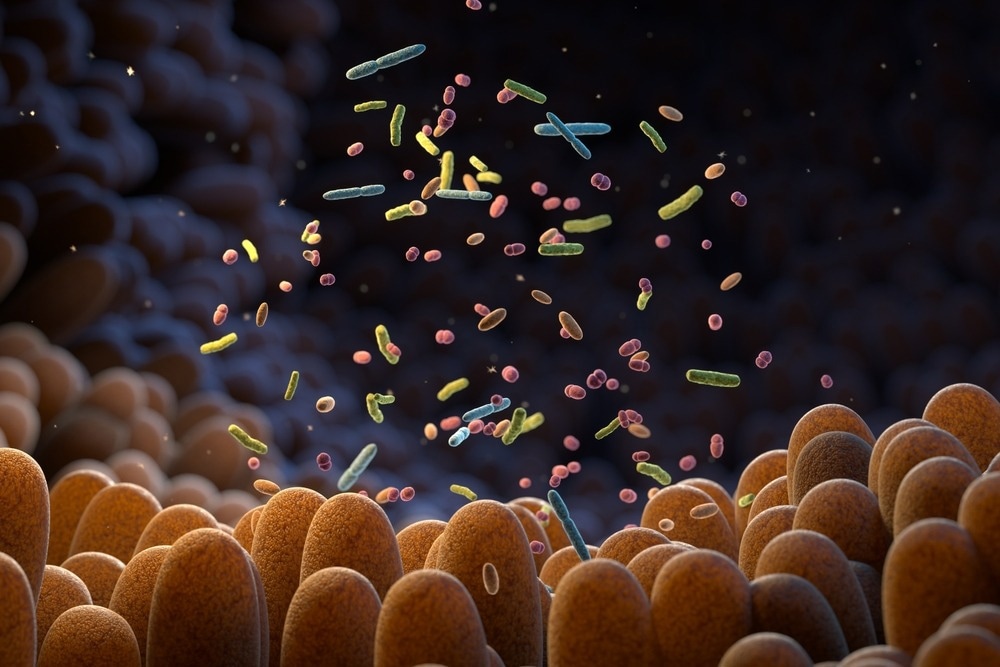A current Science Immunology examine revealed that neonatal intestine micro organism produce serotonin and down-regulate monoamine oxidase A (MOA) to restrict serotonin breakdown, thereby selling immune tolerance.

Background
Bacterial colonization within the neonatal intestine performs a vital function within the improvement of the immune system and intestinal maturation. Compared to the grownup intestine, the neonatal intestine consists of excessive ranges of sugars and milk oligosaccharides. Youngsters with bronchial asthma, meals allergic reactions, and neurodevelopmental defects expertise altered intestine microbiotas and metabolomes.
Youth is a vital part in establishing immune tolerance in opposition to intestine commensal micro organism, in addition to environmental and dietary antigens. It’s crucial to know whether or not the neonatal metabolome influences the event of immune tolerance in adolescence.
The human intestine is a serious website of neurotransmitters, similar to serotonin and dopamine, that are produced by epithelial enterochromaffin cells (ECs). These neurotransmitters affect the enteric and central nervous methods (CNSs). Latest research have proven that the absence of vital intestine micro organism is related to the altered availability of neurotransmitters for neuronal signaling. These research have additionally proven that intestine micro organism are a big regulator of neuroinflammation that governs the incidence of neurodevelopmental problems.
Serotonin (5-hydroxytryptamine or 5-HT) performs an vital function within the regulation of intestine motility, temper regulation, and platelet perform. It is very important perceive whether or not a cross-talk between serotonin and intestine immune cells happens.
In regards to the examine
The present examine investigated whether or not the neonatal intestine metabolome shapes immune tolerance in adolescence. The presence of neurotransmitters in mouse neonatal small gut (SI) was evaluated. Each in vitro and in vivo experiments have been carried out to guage immune tolerance in opposition to intestine commensal micro organism and an oral antigen (OVA).
Examine findings
The in vitro and in vivo experiments demonstrated that serotonin is chargeable for immune tolerance in adolescence. In vivo experiments indicated that neonatal intestine micro organism, as a substitute of ECs, are the most important supply of serotonin. A number of mechanisms have been recognized to be related to the enhancement of serotonin within the neonatal intestine.
The serotonin availability within the neonatal intestine was seen to be related to the direct manufacturing of this neurotransmitter by the intestine micro organism. Moreover, the intestine microbes down-regulated MAO-A to restrict 5-HT breakdown.
The oral gavage of serotonin to germ-free neonates adopted by OVA sensitization boosted long-term immune tolerance towards OVA in maturity. This experimental discovering indicated that serotonin immediately alters T cell metabolism to spice up the differentiation of regulatory T cells, which promotes long-term immune tolerance of each commensal micro organism and dietary antigens. Subsequently, neonatal gut-derived serotonin performs an vital function in shaping immune tolerance.
It is very important perceive the evolutionary advantages of enhanced neurotransmitter availability within the neonatal intestine. This examine may result in a greater understanding of how elevated neurotransmitter availability within the intestine influences GI problems. Usually, GI problems stem from imbalanced neurotransmitters throughout adolescence.
Rodentibacter was recognized as a key neonatal intestine bacterium related to the manufacturing of serotonin. A big distinction within the composition of neonatal microbiota was noticed within the SI and colon. It have to be famous that serotonin is simply produced by ECs in adults. In grownup guts, short-chain fatty acids play a vital function within the differentiation of regulatory T cells.
Conclusions
The present examine highlighted that neonatal intestine micro organism enhances serotonin availability by way of three impartial mechanisms. The primary mechanism is related to the direct manufacturing of serotonin, whereas the second mechanism is related to the activation of inducing host tryptophan hydroxylase 1 (TPH1) to advertise the conversion of tryptophan to serotonin. The third mechanism entails a discount within the breakdown of serotonin by monoamine oxidase A.
The experimental findings indicated that serotonin immediately modifies T cell metabolism by elevating intracellular indole-3-acetaldehyde that inhibits the activation of the mammalian goal of rapamycin (mTOR). Moreover, the presence of serotonin within the neonatal intestine promotes long-term immune tolerance to each intestine commensal and micro organism dietary antigens. Taken collectively, this examine emphasised the significance of serotonin in selling immune tolerance in adolescence.
Sooner or later, extra analysis must be carried out higher to know the contribution of SI microbiota to adolescence. Moreover, you will need to perceive the influence of antibiotic therapy in adolescence on the supply of key neurotransmitters within the neonatal intestine. It should even be vital to research the presence of serotonin receptors or transporters that affect the impact of serotonin on T cells.
Journal reference:
- Sanidad, Ok. Z., Rager, S. L., Carrow, H. C., Ananthanarayanan, A., Callaghan, R., Hart, L. R., Li, T., Ravisankar, P., Brown, J. A., Amir, M., Jin, J. C., Savage, A. R., Luo, R., Rowdo, F. M., Martin, M. L., Silver, R. B., Guo, C.-J., Krumsiek, J., Inohara, N. and Zeng, M. Y. (2024) Science Immunology, 9(93). doi: 10.1126/sciimmunol.adj4775. https://www.science.org/doi/10.1126/sciimmunol.adj4775


